Unit 1 What's the matter Section A 1a-2d 课件(25张PPT;无音频)
文档属性
| 名称 | Unit 1 What's the matter Section A 1a-2d 课件(25张PPT;无音频) | 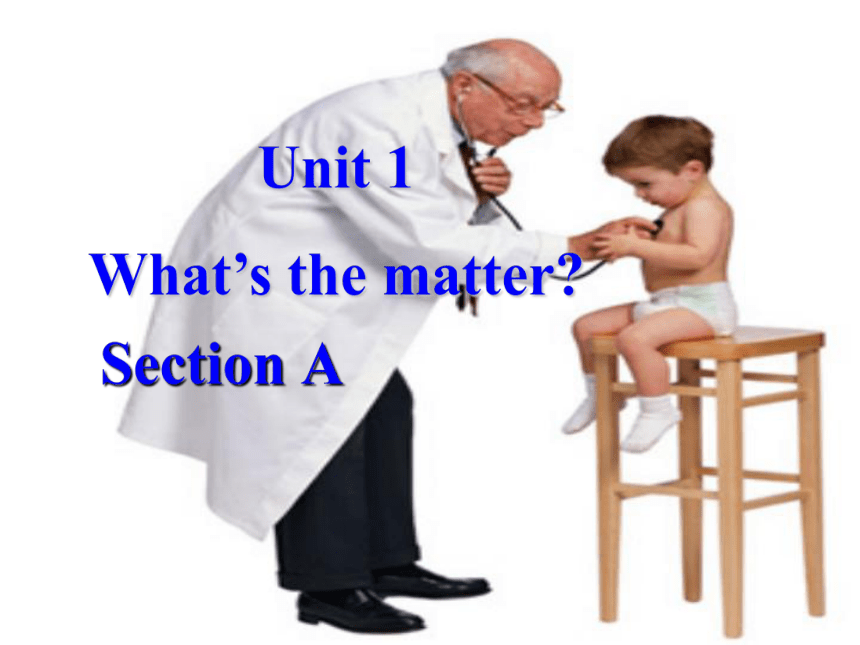 | |
| 格式 | pptx | ||
| 文件大小 | 2.1MB | ||
| 资源类型 | 教案 | ||
| 版本资源 | 人教新目标(Go for it)版 | ||
| 科目 | 英语 | ||
| 更新时间 | 2022-04-04 11:31:07 | ||
图片预览

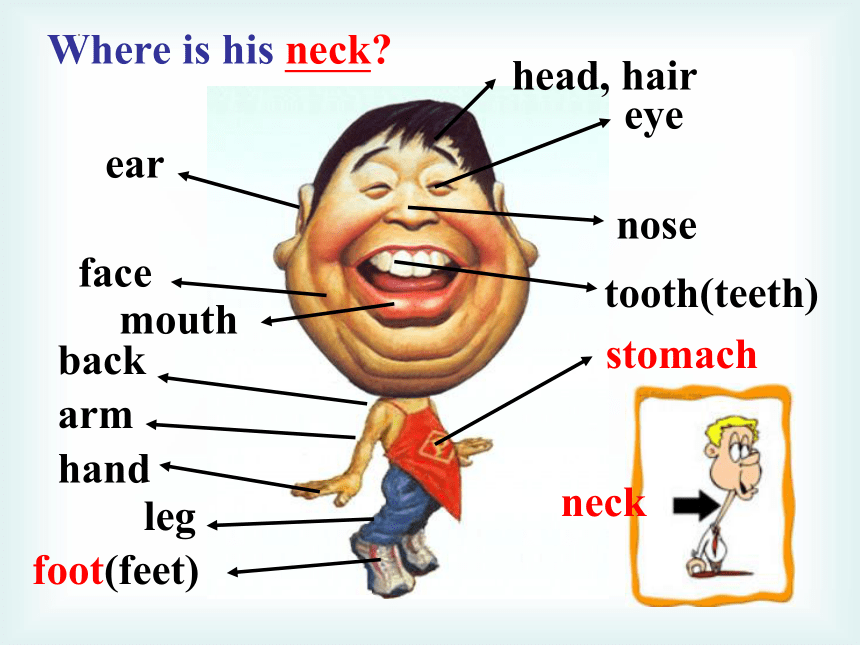
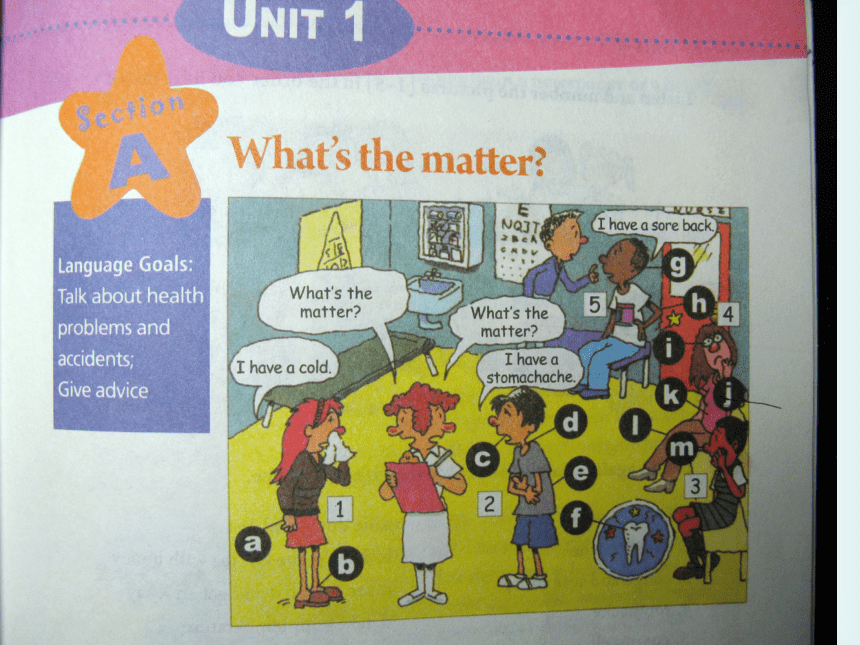
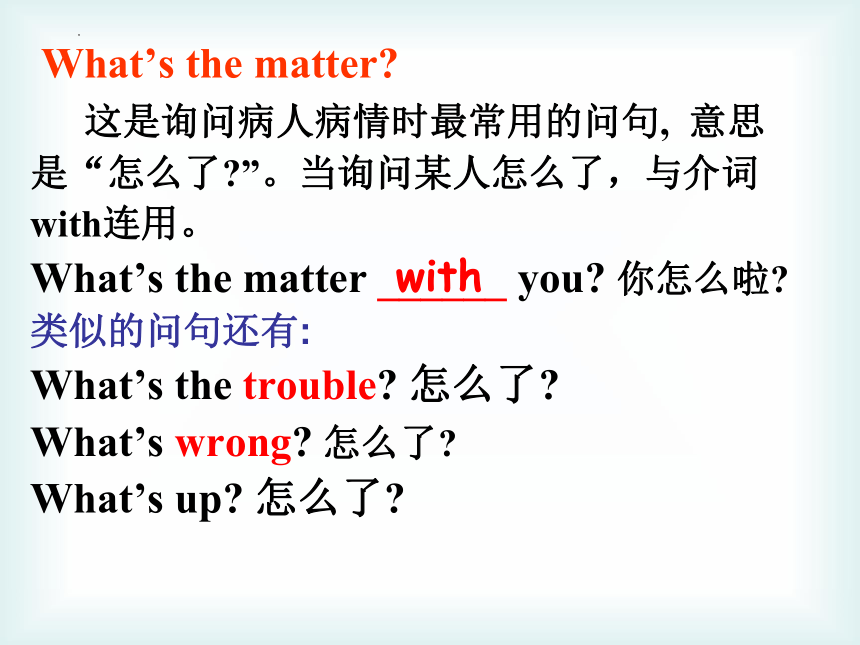
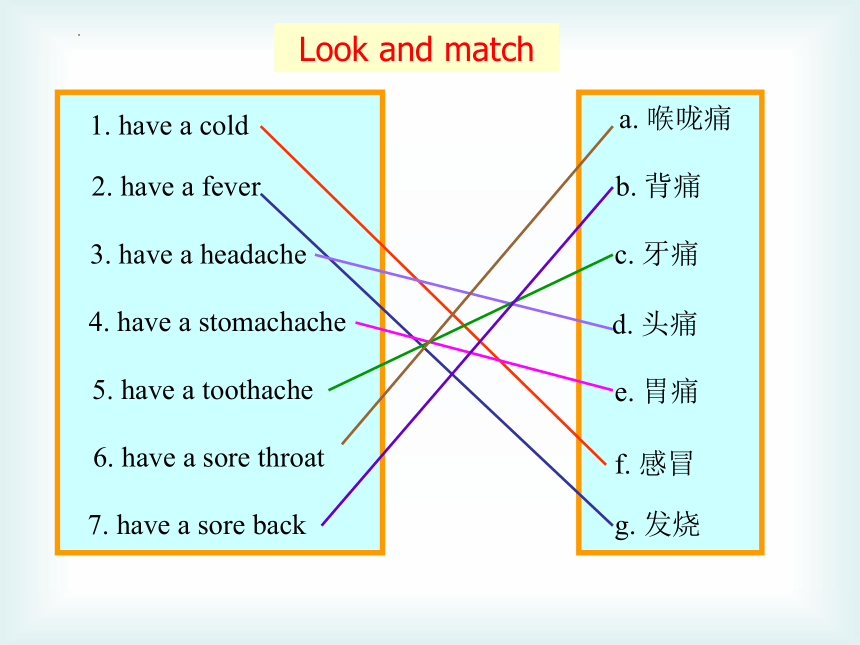
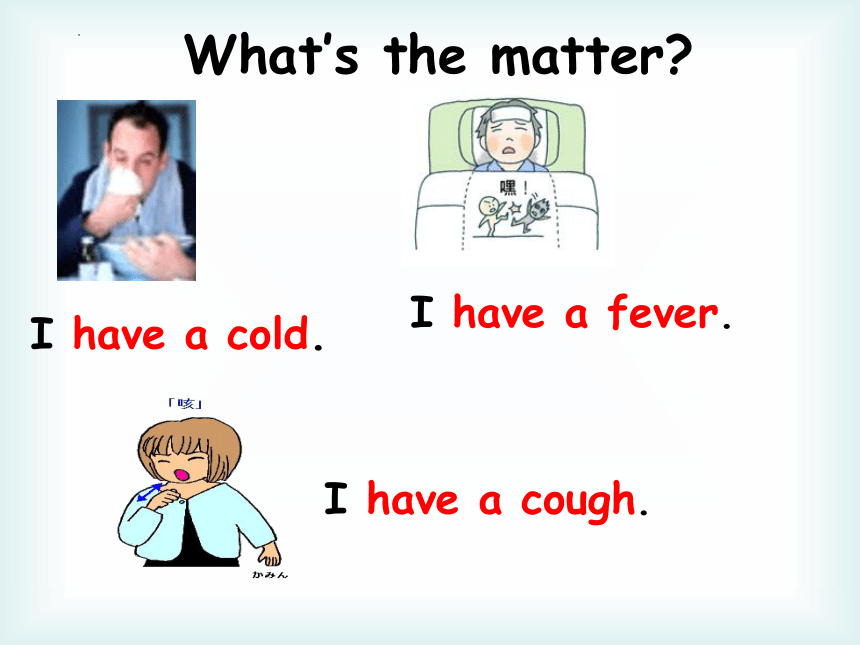
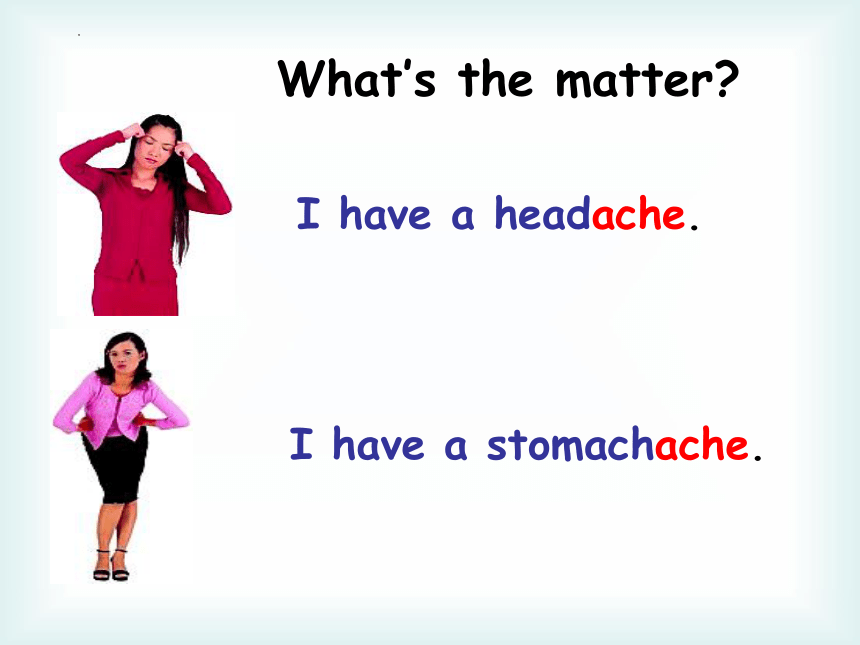
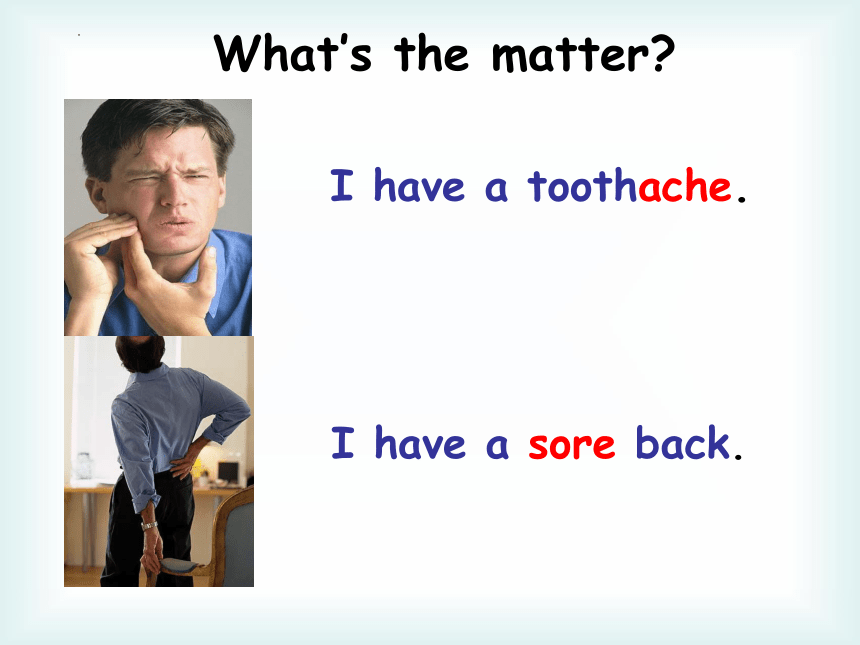
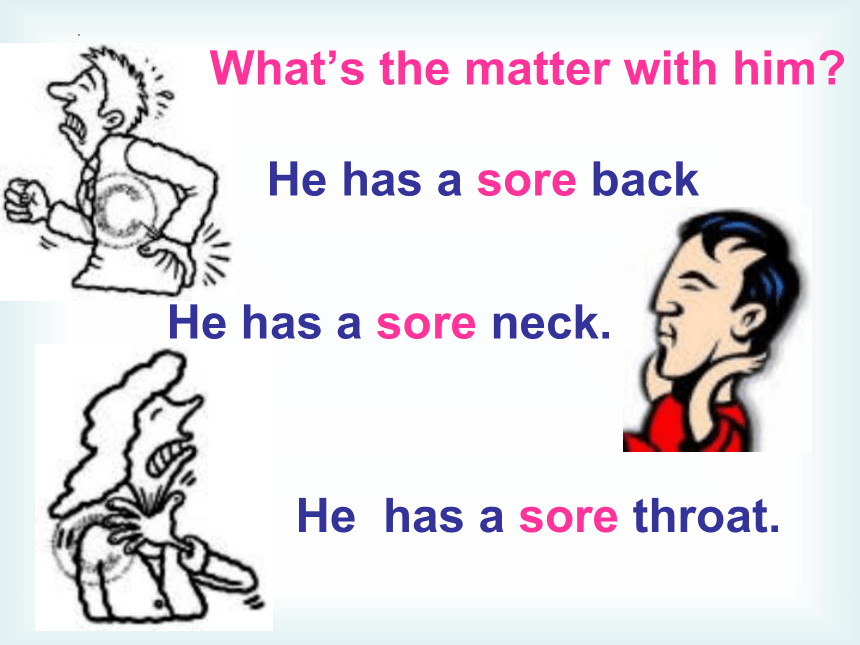
文档简介
(25张PPT;无音频)
Unit 1
What’s the matter
Section A
ear
arm
hand
leg
foot(feet)
head, hair
eye
nose
mouth
tooth(teeth)
face
stomach
back
Where is his neck
neck
What’s the matter
这是询问病人病情时最常用的问句, 意思是“怎么了 ”。当询问某人怎么了,与介词with连用。
What’s the matter ______ you 你怎么啦
类似的问句还有:
What’s the trouble 怎么了
What’s wrong 怎么了
What’s up 怎么了
with
1. have a cold
2. have a fever
3. have a headache
4. have a stomachache
5. have a toothache
6. have a sore throat
7. have a sore back
a. 喉咙痛
b. 背痛
c. 牙痛
d. 头痛
e. 胃痛
f. 感冒
g. 发烧
Look and match
What’s the matter
I have a cold.
I have a fever.
I have a cough.
What’s the matter
I have a headache.
I have a stomachache.
What’s the matter
I have a toothache.
I have a sore back.
He has a sore back
He has a sore neck.
He has a sore throat.
What’s the matter with him
表示身体不适的常用词组有:
1.感冒
2.发烧
3.咳嗽
4.胃疼
5.头疼
6.牙疼
7.脖子疼
8.嗓子疼, 喉咙疼
9.背疼
have a toothache
have a stomachache
have a fever
have a cold
have a sore neck
have a sore throat
have a headache
have a sore back
have a cough
在英语中,表达“疼痛或不舒服”时的常用结构:
(1)主语+have/has+病症
(2)主语+have/has+a+部位-ache
-ache作后缀,常与表示身体部位的名词合成一个新词,表身体某部位疼痛,如:toothache , headache , stomachache .
(3)主语+have/has+a+sore+发病部位
sore 是一个独立的形容词,指的是身体某一部位的酸痛。如:sore back, sore throat,sore neck.
历年考题集锦
The little baby has two ___.
A. tooth B. tooths C. toothes D. teeth
2. – What’s the matter with you
-- _______.
A. I’m glad B. I have a cold
C. I have something to do D. Sorry, I don’t know
3.People smell (闻) with their ___.
A. noses B. ears C. hands D. mouths
根据句意及首字母提示写出单词。
What’s the m_____ with you
2. We hear with our e____ and see with our e_____.
3. He usually goes to school on f_______.
4. I have a t________, so I want to see a dentist.
5. She talked too much yesterday and didn’t drink enough water. She has a very s_____ throat now.
yes
oot
oothache
atter
ars
ore
2b
Listen again. Match the problems with the advice.
fever
stomachache
cough and sore throat
toothache
cut myself
lie down and rest
drink some hot tea with honey
see a dentist and get an X-ray
take your temperature
put some medicine on it
Grammar
情态动词 should除了作 shall的过去式外,还表示”应该,应当”,后加动词原形,可用各种人称。它比 must 委婉,用来表示向对方提出建议和忠告,或者表示某种义务或责任。其否定式为 shouldn’t。
should/shouldn’t 的用法
Exercises:
1.He should ______ (lie) down and ______(rest).
2.You should eat so much next time.
(否定句)
You ________ ______ so much next time.
3.She should see a dentist.
______ _____ she ______
lie
rest
shouldn’t eat
What should
do
stomachache
fever
toothache
对症下药
sore throat
should
shouldn't
stay in bed .
have a good rest.
lie down and rest.
wear warm clothes.
drink lots of water.
drink hot tea.
take some medicine.
You should
.
I have a cold. What should I do
--What shouldn’t he do
--I think he shouldn’t …
He has a sore throat
shouldn’t = should not
drink cold drink.
eat ice cream.
eat hot food.
talk too much.
talk loudly.
He shouldn’t
A:What’s the matter
Do you have______________?
a toothache
B:Yes, I do.
A:You should______________.
You shouldn't ___________________.
see a dentist
eat sweet things
.
-What’s the matter
-I have a …
-Maybe you should …
-That’s a good idea./
That sounds like a good idea. /
I guess I should./
Yes, you’re right.
1. I have a headache.
2. You should go to bed.
3. He has a stomachache.
4. She shouldn’t eat anything.
5.She has a toothache.
6. She should see a dentist.
翻译下列句子:
我头痛。
你应当去睡觉。
他肚子痛。
他不应当吃任何东西。
她牙痛。
她应当看牙医。
Grammar
Focus
Read the conversation and answer the questions .
What’s the matter with Lisa
She has a headache and she can’t move her neck.
2. What did Lisa do on the weekend
She play the computer all the weekend.
3. What should Lisa do
She should lie down and rest.
2d
莉莎,你还好吗?
我头疼并且脖子不能动,我该怎么办呢?我应该量体温吗?
不需要,听起来你不像发烧了,周末你都做什么了?
我整个周末都在玩电脑游戏。
那或许就是原因吧。你需要休息一下,远离电脑。
是啊,我想我是同一个姿势坐太久没有动。
我觉得你应该躺下来休息一下。如果你的头和脖子还疼的话,就去看医生。
好的,谢谢,曼迪。
Unit 1
What’s the matter
Section A
ear
arm
hand
leg
foot(feet)
head, hair
eye
nose
mouth
tooth(teeth)
face
stomach
back
Where is his neck
neck
What’s the matter
这是询问病人病情时最常用的问句, 意思是“怎么了 ”。当询问某人怎么了,与介词with连用。
What’s the matter ______ you 你怎么啦
类似的问句还有:
What’s the trouble 怎么了
What’s wrong 怎么了
What’s up 怎么了
with
1. have a cold
2. have a fever
3. have a headache
4. have a stomachache
5. have a toothache
6. have a sore throat
7. have a sore back
a. 喉咙痛
b. 背痛
c. 牙痛
d. 头痛
e. 胃痛
f. 感冒
g. 发烧
Look and match
What’s the matter
I have a cold.
I have a fever.
I have a cough.
What’s the matter
I have a headache.
I have a stomachache.
What’s the matter
I have a toothache.
I have a sore back.
He has a sore back
He has a sore neck.
He has a sore throat.
What’s the matter with him
表示身体不适的常用词组有:
1.感冒
2.发烧
3.咳嗽
4.胃疼
5.头疼
6.牙疼
7.脖子疼
8.嗓子疼, 喉咙疼
9.背疼
have a toothache
have a stomachache
have a fever
have a cold
have a sore neck
have a sore throat
have a headache
have a sore back
have a cough
在英语中,表达“疼痛或不舒服”时的常用结构:
(1)主语+have/has+病症
(2)主语+have/has+a+部位-ache
-ache作后缀,常与表示身体部位的名词合成一个新词,表身体某部位疼痛,如:toothache , headache , stomachache .
(3)主语+have/has+a+sore+发病部位
sore 是一个独立的形容词,指的是身体某一部位的酸痛。如:sore back, sore throat,sore neck.
历年考题集锦
The little baby has two ___.
A. tooth B. tooths C. toothes D. teeth
2. – What’s the matter with you
-- _______.
A. I’m glad B. I have a cold
C. I have something to do D. Sorry, I don’t know
3.People smell (闻) with their ___.
A. noses B. ears C. hands D. mouths
根据句意及首字母提示写出单词。
What’s the m_____ with you
2. We hear with our e____ and see with our e_____.
3. He usually goes to school on f_______.
4. I have a t________, so I want to see a dentist.
5. She talked too much yesterday and didn’t drink enough water. She has a very s_____ throat now.
yes
oot
oothache
atter
ars
ore
2b
Listen again. Match the problems with the advice.
fever
stomachache
cough and sore throat
toothache
cut myself
lie down and rest
drink some hot tea with honey
see a dentist and get an X-ray
take your temperature
put some medicine on it
Grammar
情态动词 should除了作 shall的过去式外,还表示”应该,应当”,后加动词原形,可用各种人称。它比 must 委婉,用来表示向对方提出建议和忠告,或者表示某种义务或责任。其否定式为 shouldn’t。
should/shouldn’t 的用法
Exercises:
1.He should ______ (lie) down and ______(rest).
2.You should eat so much next time.
(否定句)
You ________ ______ so much next time.
3.She should see a dentist.
______ _____ she ______
lie
rest
shouldn’t eat
What should
do
stomachache
fever
toothache
对症下药
sore throat
should
shouldn't
stay in bed .
have a good rest.
lie down and rest.
wear warm clothes.
drink lots of water.
drink hot tea.
take some medicine.
You should
.
I have a cold. What should I do
--What shouldn’t he do
--I think he shouldn’t …
He has a sore throat
shouldn’t = should not
drink cold drink.
eat ice cream.
eat hot food.
talk too much.
talk loudly.
He shouldn’t
A:What’s the matter
Do you have______________?
a toothache
B:Yes, I do.
A:You should______________.
You shouldn't ___________________.
see a dentist
eat sweet things
.
-What’s the matter
-I have a …
-Maybe you should …
-That’s a good idea./
That sounds like a good idea. /
I guess I should./
Yes, you’re right.
1. I have a headache.
2. You should go to bed.
3. He has a stomachache.
4. She shouldn’t eat anything.
5.She has a toothache.
6. She should see a dentist.
翻译下列句子:
我头痛。
你应当去睡觉。
他肚子痛。
他不应当吃任何东西。
她牙痛。
她应当看牙医。
Grammar
Focus
Read the conversation and answer the questions .
What’s the matter with Lisa
She has a headache and she can’t move her neck.
2. What did Lisa do on the weekend
She play the computer all the weekend.
3. What should Lisa do
She should lie down and rest.
2d
莉莎,你还好吗?
我头疼并且脖子不能动,我该怎么办呢?我应该量体温吗?
不需要,听起来你不像发烧了,周末你都做什么了?
我整个周末都在玩电脑游戏。
那或许就是原因吧。你需要休息一下,远离电脑。
是啊,我想我是同一个姿势坐太久没有动。
我觉得你应该躺下来休息一下。如果你的头和脖子还疼的话,就去看医生。
好的,谢谢,曼迪。
同课章节目录
- Unit 1 What's the matter?
- Section A
- Section B
- Unit 2 I'll help to clean up the city parks.
- Section A
- Section B
- Unit 3 Could you please clean your room?
- Section A
- Section B
- Unit 4 Why don't you talk to your parents?
- Section A
- Section B
- Unit 5 What were you doing when the rainstorm came
- Section A
- Section B
- Review of Units 1-5
- Unit 6 An old man tried to move the mountains.
- Section A
- Section B
- Unit 7 What's the highest mountain in the world?
- Section A
- Section B
- Unit 8 Have you read Treasure Island yet?
- Section A
- Section B
- Unit 9 Have you ever been to a museum?
- Section A
- Section B
- Unit 10 I've had this bike for three years.
- Section A
- Section B
